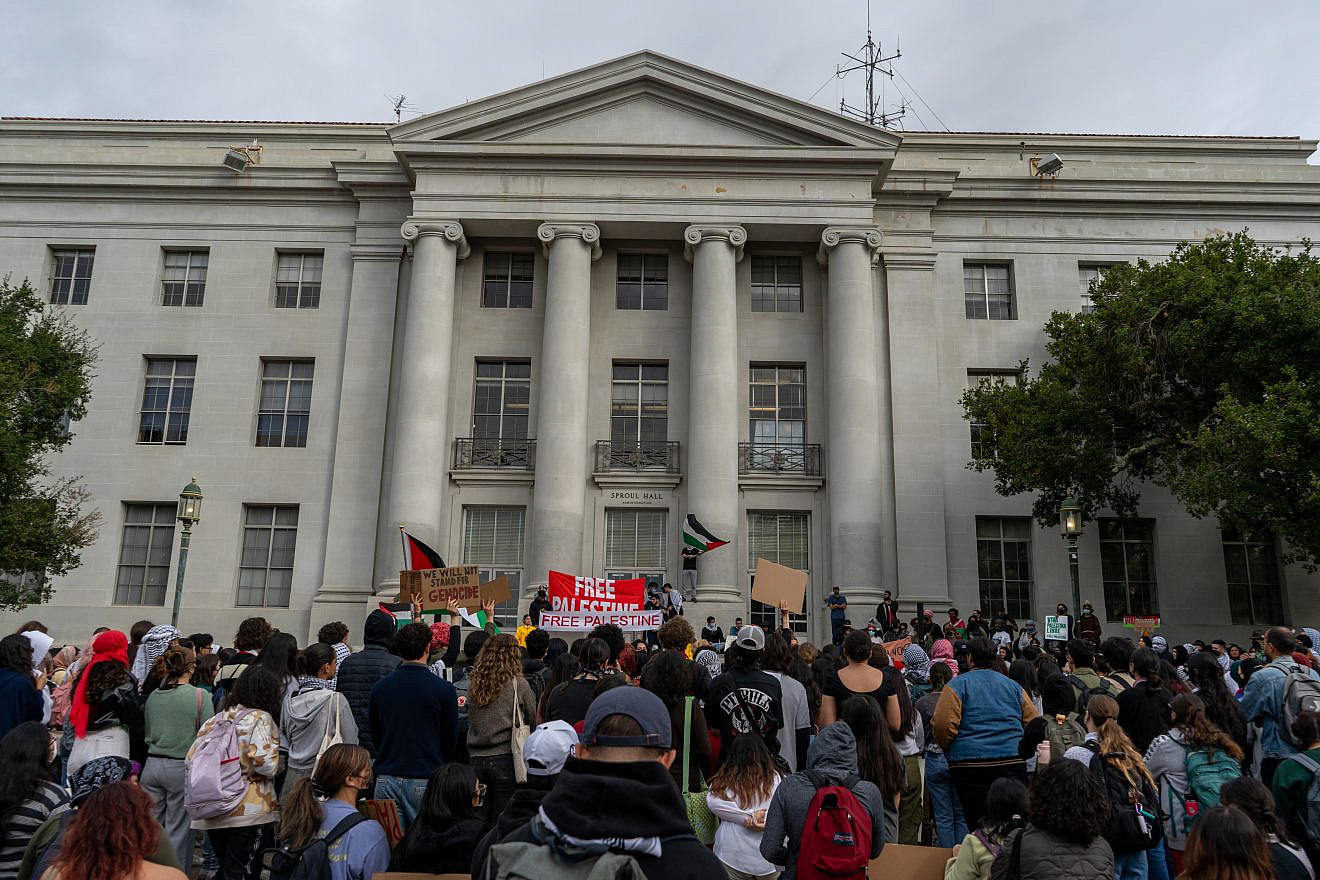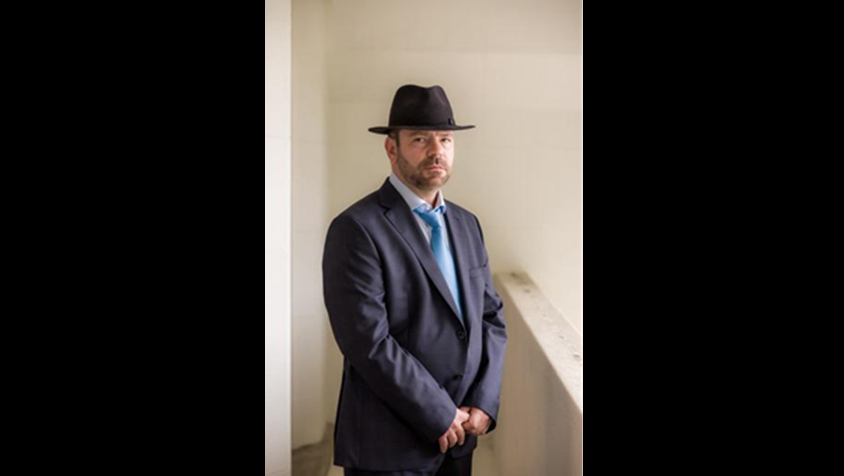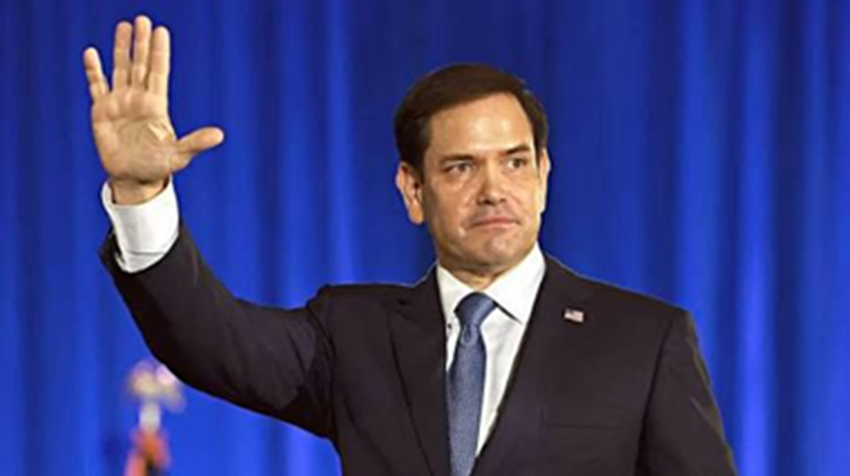Students hold up anti-Israel signs and Palestinian flags at an anti-Israel protest in front of Sproul Hall at the University of California, Berkeley, on Oct. 25, 2023. Credit: Kefr4000 via Wikimedia Commons.
For a few weeks after the Oct. 7 attacks, it seemed as if American Jewry was waking up. The massive pro-Israel rally held in Washington, D.C., on Nov. 14 was an indication that large numbers of Jews—as many as 300,000 attended in person with an estimated quarter-million others watching it livestreamed and on C-SPAN—still cared deeply about the Jewish state and understood that their own lives and fate was tied up with it. But three months later, as American public discourse has become largely dominated by a false narrative about Israeli “genocide” in Gaza as the war to eliminate Hamas terrorists drags on, perhaps it’s time to ask just what happened to that spirit of activism?
Just as the memory of the massacre of Jews in communities in southern Israel and at the Nova music festival has been largely erased from the mainstream media by the drumbeat of invective about the alleged suffering of those who launched the war, the sense of American Jewish solidarity with Israel has also seemed to be diminishing. In the weeks following the D.C. rally, the news was filled with stories about increasingly aggressive anti-Israel rallies on the streets of American cities and especially on college campuses. The hallmark of these events was the unfiltered antisemitism on display with not just chants for the destruction of the one Jewish state on the planet (“from the river to the sea”) and for terrorism against Jews wherever they live (“globalize the intifada”), but also violence.
While many, if not most, community members are still anguished about events in Israel and worried about their own future, it seems to be largely business as usual in the organized Jewish world. Jewish groups have raised money for Israel and lobbied members of Congress to stand fast in their support for the Jewish state. And it’s true that some courageous Jewish funders began a movement pushing back against the tolerance for antisemitism that was common on elite college campuses—symbolized by the congressional testimony of three university presidents who managed only to say that it depended on “context” as to whether calls for Jewish genocide were against their codes of conduct.
The streets belong to the antisemites
But since that November rally, the public square has, with a few exceptions, increasingly belonged to the antisemites who often block traffic or tunnels and bridges with impunity. It’s not just that Jews are usually cautioned by their leaders as well as public authorities to steer clear of confrontations with those smearing Israel or cheering those who spill Jewish blood. There also seems to be a general consensus that Jewish interests are not best served by mobilizing the Jewish public again in that manner. After months of American Jews being subjected to the incessant incitement against Israel in the liberal media outlets that the majority of them read, listen or watch, perhaps that’s also rooted in fears that another mass response in the manner of Nov. 14 isn’t likely.
Just as troubling is the general acquiescence with which major Jewish groups who purport to speak for the community have greeted the turn against Israel on the part of the Biden administration. While President Joe Biden was rightly lauded by Jewish groups for his pro-Israel stand at the start of the war, including his support for the elimination of Hamas, he has gotten a pass from legacy organizations like the American Jewish Committee and the Anti-Defamation League for his campaign of pressure aimed at hamstringing the efforts of the Israel Defense Forces to achieve that goal.
Just as important, his constant invocation of the need to create a Palestinian state after the war has been met with either silence or approval from the same liberal groups that still claim to be steadfast in their post-Oct. 7 pro-Israel advocacy. That is also true of Biden’s decision to go back on a Trump administration ruling that Israeli communities in Judea and Samaria were not illegal, coupled with gratuitous sanctions on Jewish settlers; both seemed aimed at preparing the way for a renewed campaign for forcing Israel out of the territories.
So, what’s behind that Jewish silence?
Part of the explanation is politics. The president is worried about the open revolt among left-wing Democrats against any pro-Israel policies. The petitions from lower-level administration officials, Democratic congressional staffers and even his re-election campaign staffers illustrate just how hostile the intersectional activist base of the party is to Israel and Zionism. That has now been compounded by the president’s problems in the battleground state of Michigan, where the threatened defection of Arab-American and Muslim voters calls into question his ability to win there.
Appeasing pro-Hamas voters
Biden has always claimed that he entered the 2020 presidential race in reaction to the “Unite the Right” neo-Nazi rally at Charlottesville, Va., in the summer of 2017. So, it is no small irony that he now thinks that the only way to hold onto office is by appeasing antisemites in Dearborn, Mich.—America’s “jihad capital,” whose pro-Hamas mayor somehow seems to have more pull in Washington these days than any Jewish leader.
But rather than getting pushback from Jewish groups over this appalling state of affairs, most of them are prepared to ignore it. One of the reasons for that silence is that their staff and major liberal donors believe Biden’s re-election is more important than the way the administration is mainstreaming figures who ought not to be treated in this manner by any White House.
Equally important is that as the memory of Oct. 7 recedes further into the background, the pre-war attitudes of many of these groups and their leaders have reasserted themselves—namely, the impulse to “save Israel from itself.”
The disconnect between most American Jews and Israelis about the peace process with the Palestinians since the collapse of the Oslo Accords during the horror of the Second Intifada in Israel was obvious. Throughout the last 20 years, those same legacy Jewish groups have never wavered in their support for the two-state formula that has long since ceased having the backing of most Israelis.
On Oct. 6, Israel was bitterly divided about the question of reforms to the judicial system proposed by Prime Minister Benjamin Netanyahu after his victory in the Knesset election in November 2022. And the Israeli public was, as it has been for several years, similarly at odds with Netanyahu himself, who after so many years in power is both hated and loved. Still, there was little debate about the wisdom of replicating former Prime Minister Ariel Sharon’s 2005 experiment—in which he withdrew every Israeli settlement, settler and soldier from the Gaza Strip in order to create an incubator for peace—in the far larger and more strategic areas of Judea and Samaria.
No to a Palestinian state
The Oct. 7 massacres, in which the independent Palestinian state in all but name ruled by Hamas, used their secure Gaza base to launch a war was the final confirmation that Sharon’s idea was one of the colossal blunders of Israeli history, if not that of the 21st century as a whole.
The notion that the proper response to Oct. 7 is not just a ceasefire that will allow Hamas to survive, but rewarding the Palestinians with a state, is something that can only be described as both insane and immoral. Any effort towards that goal now would rightly be regarded by both Palestinians and the rest of the world as a reward for the unspeakable atrocities Hamas operatives and ordinary Palestinians did that day and plan to do again and again. That would not only make the already remote chances of peace with the Palestinians in the foreseeable future even more unlikely. It would be an invitation to a still-standing Hamas, as well as its supposedly more “moderate” rivals in the Palestinian Authority, to launch similar attacks not just in the Gaza Envelope but in Judea and Samaria, and throughout central Israel and the Jerusalem area.
That is something that post-Oct. 7 Israel will not tolerate. As divided as Israelis may be about Netanyahu, the overwhelming majority of them, including many who despise the prime minister, are united behind the war to eliminate Hamas.
Yet American Jewish groups, with a few conspicuous exceptions like the Zionist Organization of America, are behind Biden’s efforts to save Hamas and thwart the will of the Israeli people.
During the Barack Obama presidency, the idea that it was OK to support American pressure on Israel’s democratically elected government was legitimized not just by left-wing outliers like J Street but by other more mainstream Jewish groups. And even though the war against Hamas—something U.S. Jews were supposedly united behind—isn’t over, some of them are already reverting to that “save Israel from itself” rhetoric.
Contempt for Israeli opinion and security
Rabbi Rick Jacobs, the head of Reform Judaism, has already signaled to members of his movement that it’s time to rejoin the anti-Netanyahu resistance and support Biden’s efforts to override Israeli democracy as well as its security. Just as ominously, groups like the Religious Action Center of Reform Judaism are also making it clear that they value their alliances with radical Muslims, who hate Israel, more than their obligations to the Jewish state. RAC director Rabbi Jonah Pesner posted on Facebook a happy picture at a lunch with an official of the Islamic Society of North America. Anyone who wants to know where that group stands on the war against Hamas should read the latest issue of their magazine, Islamic Horizons, which is a compendium of both smears of Israeli “genocide” and support for Hamas’s survival.
Yet leaders of the largest Jewish religious denomination in the United States think that the Islamic Society of North America is their natural ally with whom, in Pesner’s words, they can find “common ground.” The same is true with those left-wing Jews who are taking sides with the anti-Israel mobs in Michigan and elsewhere.
This illustrates not just contempt for Israeli public opinion but utter disinterest in the Jewish state’s existential struggle against genocidal terrorists, even though many of those who take these stands will, incredibly, still contend that they still want what’s best for Israel.
Amid the agony, frustration and anger among Jews about the crimes of Oct. 7 and the subsequent surge in antisemitism in the United States, there was hope—even an expectation— that these events might scare the Jewish community enough to rethink some of their foolish assumptions about Israel and the peace process that had characterized so much of Jewish discourse in recent years. And it may be that many ordinary Jews, political liberals among them, may well be shocked enough by their betrayal by former minority allies and elite institutions that have appeased antisemites to be willing to question some of those mistaken attitudes that were so out of touch with the reality on the ground in the Middle East.
Yet anyone who imagined that liberal Jewish organizations were capable of such a reassessment was clearly wrong. Just as the alphabet soup of the ADL, AJC and RAC won’t change their minds about toxic ideologies that enable antisemitism, they are still not willing to give up trying to save Israel from itself. Instead, they should concentrate on trying to defend American Jews from groups and ideas that are targeting them. It seems as if these well-funded organizations not only can’t save Israel but also don’t know how to save themselves.
Source: JNS



































